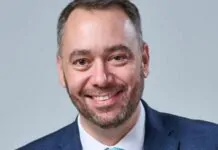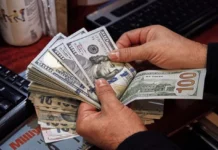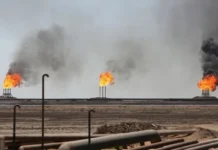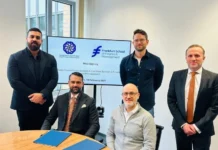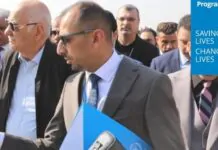Tishwash: Kurdistan Showcases Investment Opportunities at Paris Forum
The Kurdistan Region is showcasing its investment potential at the French-Iraqi Economic Business Forum currently underway in Paris, with top officials encouraging French investors to explore opportunities in key sectors.
Mohammed Shukri, Head of the Kurdistan Region’s Investment Board, addressed a panel during the event, highlighting the Region’s supportive investment environment.
He emphasized the availability of promising opportunities in the industrial, agricultural, tourism, and energy sectors.
“Now is the time for foreign investors, particularly our French partners, to engage with the Kurdistan Region’s growing economy,” Shukri said, according to a statement released by the Investment Board.
The statement noted that several foreign investors, particularly French businesspeople, expressed readiness to visit the Kurdistan Region to explore investment opportunities firsthand and potentially boost France’s economic footprint in the area.
More than 300 foreign investors and businesspeople—mostly French—are attending the forum, underscoring France’s continued interest in Iraq’s and the Kurdistan Region’s economic landscape.
This event builds on momentum from last year’s first French-Kurdistan Economic Forum, also held in Paris.
The gathering was organized in coordination with the Kurdistan Regional Government’s Investment Board and MEDEF, France’s largest business federation, to strengthen bilateral economic ties and attract more French investment to the Region. link
Tishwash: from Iran’s news
Baghdad or Erbil? Who controls Iraq’s wealth?
The Iraqi Ministry of Oil declared two agreements between two American energy companies and the Kurdistan Regional Government of Iraq “null and void” due to their failure to obtain federal approval.
The World – Correspondents
The tense relationship between Baghdad and Erbil has once again come to the fore after the Kurdistan Region of Iraq signed two massive gas field development agreements with two American companies worth more than $110 billion. This move sparked widespread political and legal controversy and brought to the fore an old question: Who owns the decision-making power over Iraq’s resources?
Political analyst Naseem Abdullah told Al-Alam TV: “The Iraqi constitution states in Articles 110, 112, and 121 that the management of oil resources is a joint management between the region and the federal government. This provision is explicit, as the 2005 constitution stated that these resources are managed jointly by the region and the federal government. Currently, the region has violated the constitution through its unilateral management, which constitutes a breach of it.”
The agreement, announced by the Prime Minister of the Kurdish region, Masrour Barzani , includes the development of massive oil and gas reserves in the Mizan, Topkhana, and Kordemir fields, potentially transforming Kurdistan into a regional energy hub. However, Baghdad, through the Ministry of Oil, quickly declared the agreement invalid, asserting that it violates the constitution and a ruling by the Federal Supreme Court.
Law professor Mohammed Adiq told Al-Alam TV: “Regarding the relationship between the Kurdistan Regional Government and the federal authorities, it is governed by Articles 110, 114, and 112. Therefore, the expired Kurdistan Regional Government must partner with the federal government in managing oil and gas and concluding oil contracts.”
On the other hand, Erbil believes its actions are legal and within its jurisdiction, citing the absence of a federal law regulating the oil and gas sector. It asserts that the revenues will benefit both Kurdistan and Iraq.
Kurdish political analyst Hussein Al-Jaf said, “What happened is not a new contract, but rather the transfer of ownership of the project, which was operating in oil, from Kurdistan to another company. Therefore, there is no such thing as a renewed contract.”
This sharp contrast raises a highly complex legal and political issue. While Baghdad champions sovereignty over resources, Erbil asserts that it is exercising a constitutional right that is absent from the national agreement.
The relationship between Baghdad and Erbil remains hostage to intense disagreements over resource management, with Baghdad insisting on centralized decision-making and Erbil insisting on its constitutional rights. The absence of a national agreement is evident, making every crisis a renewed conflict between Baghdad and Erbil. link
************
Tishwash: Speaking to CNN Arabic
President of the Republic: There are no Iranian forces in Iraq, nor any Iraqi forces in Iran.
Iraqi President Abdul Latif Rashid denied on Wednesday the presence of Iranian forces inside Iraq or vice versa, noting that the matter is limited to a regular exchange of delegations to discuss common issues. He also reiterated that the absence of an oil and gas law is behind the outstanding issues between the federal government and the Kurdistan Region, during a television interview with CNN Arabic.
The Arab Summit is essential in the current circumstances. The Middle East and Arab countries are suffering from several problems, most notably the aggression against the Palestinian people and the internal situations in Sudan, Syria, and Lebanon.
There is a genuine intention on the part of the Arab countries and the countries of the region to end the suffering of the Palestinian people.
We must work to stop the fighting in Palestine, deliver humanitarian aid to the Palestinian people, and then develop a political roadmap for Palestinians to achieve their legitimate rights in accordance with United Nations resolutions.
Syria is an important country for Iraq in all social, religious, and cultural aspects. We are connected to each other, and we want good and strong relations with Syria. We want the Syrian government to take into consideration the Syrian people in all their diversity and ensure their representation.
We have a long border with Syria, and there are terrorists on the border, either alone or with their families of various nationalities. This security issue must be resolved amicably with the Syrian side.
We are working to resolve the border security crisis with Türkiye and the presence of its forces inside Iraq, especially given the Kurdistan Workers’ Party’s decision to pursue peaceful means to resolve the issue.
Our relations with Türkiye are good in terms of trade and diplomacy, and our trade is strong, amounting to tens of billions annually. We hope to resolve the security issue.
Our relations with Iran are long-standing, normal, and strong. There are no Iranian forces inside Iraq or vice versa. There is a constant exchange of delegations to discuss all existing issues.
Most of Iraq’s water resources come from Türkiye and Iran, and most of it comes from Türkiye. We need a fair share to meet the needs of the population and agricultural requirements.
Our relations with neighboring countries and the region, including Egypt and Jordan, are strong and solid, and there is an exchange of expertise and business to improve infrastructure.
Our relations with the United States are normal and good, and agreements exist between the two parties and are being studied jointly. The decision on whether or not to keep forces is left to the ongoing negotiations between the two parties.
We welcome the visit of President Trump and European delegations to the region to hear directly from the region’s leaders about existing problems and work to resolve them.
We hope that the ongoing negotiations between the United States and Iran will be successful and will benefit everyone.
Iraq is ready to serve as a mediator between Iran and the United States to ensure the success of negotiations, if requested.
The absence of an oil and gas law is behind the outstanding issues between the federal government and the Kurdistan Region. Negotiations are ongoing between the two sides to resolve issues such as salaries, oil, and other matters.
The elections will be held on schedule, and we are working to ensure that they are safe, stable, and fair, ensuring broad participation by the Iraqi people.
(60%) of Iraq’s population are young people, and they constitute the largest group. They must be supported, and we need their participation in supporting the political process, defending security and stability, and for them to be an interested part in solving problems. link

